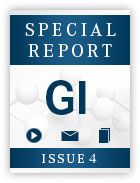Predictors of Toxicity in Colon Cancer Treatment Identified
In the largest patient population study to date, Mayo Clinic investigators have identified new genetic predictors of toxicity to colon cancer treatment, but the study has some caveats.
In the largest patient population study1to date, Mayo Clinic investigators have identified new genetic predictors of toxicity to colon cancer treatment, but the study has some caveats.
According to data presented at the 2015 Gastrointestinal Cancers Symposium, the novel haplotype HapB3 and the deep intronic variant c.1129-5923 C>G were shown to be moderately predictive of severe toxicity related to treatment with 5-fluorouracil (5-FU) in patients with stage III colon cancer who do not harbor the DPYD*2A, D949V, and I560S variants already associated with treatment toxicity.
“Severe adverse events (AEs) to 5-FU constitute a major dilemma in colon cancer treatment,” said Adam M. Lee, PhD, department of molecular pharmacology and experimental therapeutics, Mayo Clinic, Rochester, Minnesota.
“Our goal in this study was to assess the relationship between the DPYD HapB3 haplotype (and its individual variants), the deep intronic variant, and severe AEs common to 5-FU-based therapy,” Lee explained.
Of the approximately 275,000 patients with cancer who are treated with 5-FU in the United States each year, the National Institutes of Health (NIH) estimates that more than 8000 develop serious toxic reactions to 5-FU and that more than 1300 die each year from those toxicities.2
According to Lee, other studies have suggested potential associations between AEs and noncoding DPYD variants: a novel haplotype (HapB3) containing 3 intronic variants (c.483+18 G>A, c.680+139 G>A, and c.959-51 T>C), one synonymous variant (c.1236 G>A, E412E), and a deep intronic variant (c.1129-5923 C>G) that affects pre-messenger RNA (pre-mRNA) splicing. However, these studies included a diversity of cancer types, stages, and treatments, requiring further evaluation in a refined population.
Lee’s study involved 2134 Caucasian patients with stage 3 colon cancer who lack the DPYD*2A, D949V, and I560S variants already associated with toxicity (from the NCCTG N0147 trial). Patients received adjuvant FOLFOX (the oxaliplatin/5-FU/leucovorin combination) or FOLFIRI (the 5-FU/leucovorin/irinotecan combination) +/- cetuximab and were genotyped by multiplexed, single-base extension assays on the Sequenom MassARRAY® analysis platform. In the Mayo study, 1339 patients (62.8%) and 705 patients (33.0%) reported at least one grade 3+ (G3+) AE overall and 5-FU AE, respectively.
Clinical Pearls
Subcohort analysis identified the following associations:
- c.959-51 T>C, c.1236 G>A, c.483+18 G>A, c.1129-5923 C>G, and HapB3 (with or without c.1129-5923 C>G) significantly associated with G3+ 5-FU AEs in females and FOLFOX-only patients, but not in white males, in FOLFOX + cetuximab patients, or in patients receiving irinotecan.
- c.1236 G>A, c.1129-5923 C>G, and HapB3 (with or without c.1129-5923 C>G) significantly associated with G3+ 5-FU AEs in KRAS wild-type (WT)/BRAF WT patients and KRAS WT/BRAF-mutant patients, but not in KRAS-mutant /BRAF WT patients.
- c.680+139 G>A significantly associated with G3+ overall AEs in patients receiving irinotecan (OR, 4.684; 95% CI, 0.955-11.22;P= .0005) and displayed moderate associations with G3+ overall AEs in males (OR, 1.310; 95% CI, 0.984-1.745;P= .0642) and in KRAS/BRAF WT patients (OR, 1.317; 95% CI, 0.983-1.764;P= .0653).
- “Significant interactions between DPYD variants and patient characteristics on 5-FU AEs along with the subcohort analysis suggest a much greater predictive effect in Caucasian females (compared to males), in patients treated with FOLFOX only (compared to FOLFOX + cetuximab), and in patients with WT KRAS status (compared to mutant KRAS patients),” Lee said, while also emphasizing the need for additional testing.
- To date, the DPYD gene has more than 16,500 reported variants, nearly 130 of which result in a change to the amino acid sequence. However, as Lee observed, most have yet to be functionally characterized.
- “Further analysis is needed to determine the effect of other common DPYD variants in combination with HapB3 and c.1129-5923 C>G variants on 5-FU-related AE incidence,” he concluded.
“Among the primary cohort,” noted Lee, “a moderate association was identified between G3+ 5-FU AEs and the deep intronic c.1129-5923 C>G variant (odds ratio [OR], 1.539; 95% confidence interval [CI], 1.001-2.367;P= .0493). However, after adjusting for multiple covariates, this association was no longer statistically significant (OR, 1.558; 95% CI, 0.976-2.488;P= .0630).”
Genes Interact With Patient and Treatment Factors
Only the more frequent DPYD HapB3 variant c.680+139 G>A showed a significant association with G3+ overall AE rate (OR, 1.263; 95% CI, 1.016-1.572;P= .0356).In general, in the absence of DPYD*2A, D949V, and I560S, the HapB3 haplotype and the deep intronic variant have limited predictive value for severe toxicity to adjuvant 5-FU-based combination chemotherapy, but, according to Lee, the findings showed that specific variables such as sex, treatment, and KRAS status may significantly affect their predictive value.
“Significant interaction effects on G3+ 5-FU AEs were identified between DPYD variants and sex andKRAS/BRAFmutation status,” Lee explained, “with a moderate interaction effect with treatment.”
References
- Lee AM, Shi Q, Alberts SR, et al. HapB3 and the deep intronic variant c.1129-5923 C>G of the dihydropyrimidine dehydrogenase gene (DPYD) to predict toxicity in stage III colon cancer (CC) patients (pts) (NCCTG Alliance N0147). Presented at: 2015 Gastrointestinal Cancers Symposium. January 15, 2015. Abstract 508.
- National Institutes of Health. Federal Register 73(129):38233, 2008.

Brahmer Considers First-Line Immunotherapy Options in Metastatic NSCLC
February 17th 2025During a Case-Based Roundtable® event, Julie R. Brahmer, MD, MSC, reviewed the CheckMate 9LA, KEYNOTE-407, and POSEIDON trials of immunotherapy in patients with metastatic non–small cell lung cancer.
Read More